Data-Driven Hiring | Hiring Best Practices
AI Recruitment Tools: How They Work, Key Benefits, and Top Options for 2025
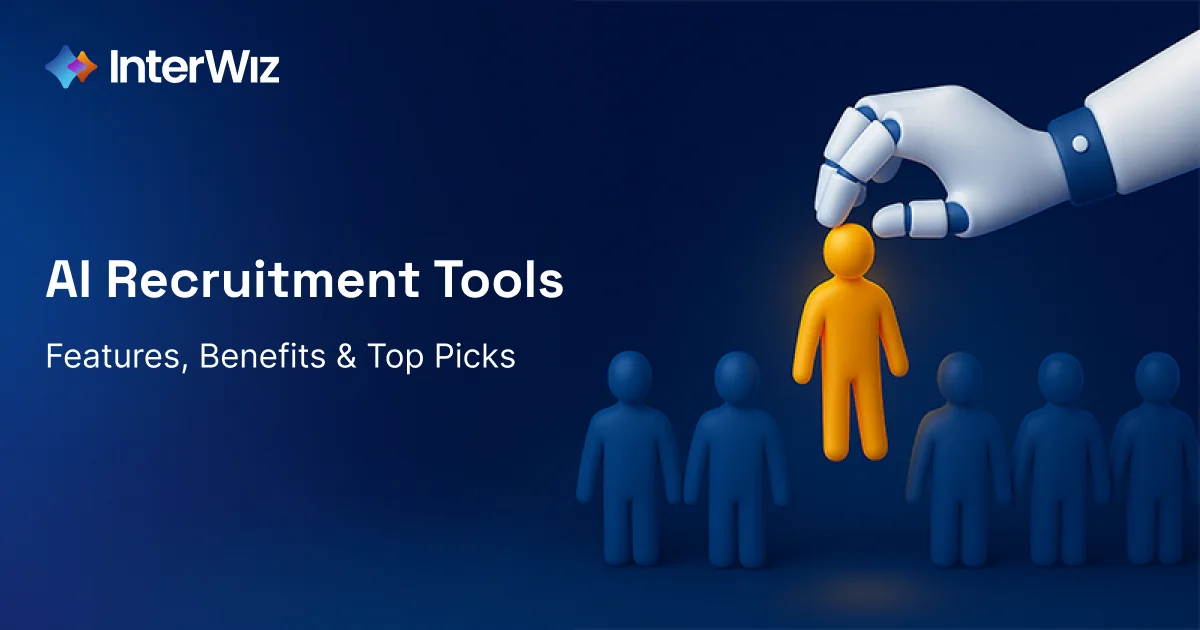
AI recruitment tools are reshaping how companies source, assess, and hire talent, automating labor-intensive tasks like resume screening, interview scheduling, skill assessments, and candidate ranking. What once took days of manual effort now happens in minutes, allowing recruiters to focus on strategic hiring decisions and building stronger candidate relationships.
In this guide, you will learn what AI recruitment tools are, how they work, which features deliver the most impact, and the leading HR platforms in 2025. We will also share a practical framework to help you choose the right solution for your team while avoiding costly mistakes.
What Is an AI Recruitment Tool and Why It Matters Now
An AI recruitment tool is software that uses artificial intelligence to streamline and improve key hiring stages, from sourcing candidates to conducting structured interviews. These platforms apply natural language processing to interpret resumes, machine learning algorithms to predict job fit, and generative AI to personalize communication at scale.
This matters now because hiring teams face growing pressure to move faster, secure top candidates before competitors, and ensure bias-free decision-making. Manual resume review, back-and-forth interview scheduling, and inconsistent evaluation processes slow hiring and increase the risk of losing qualified candidates.
A well-designed AI recruitment tool can scan hundreds of resumes in minutes, shortlist the most relevant profiles, and schedule interviews automatically while applying consistent, criteria-based evaluation to every applicant. The result is a hiring process that is faster, fairer, and more transparent from start to finish.
How AI Recruitment Tools Improve Hiring Efficiency and Quality
AI recruitment tools speed up hiring and improve decision quality by automating the most time-intensive stages of recruitment. Instead of manually reviewing hundreds of applications, recruiters can access a shortlist of candidates who best match the role based on skills, experience, and job requirements.
Key ways these tools deliver results include:
Automated candidate screening: Quickly filters large applicant pools to identify candidates who meet essential job criteria.
Smart interview scheduling: Coordinates interview slots with candidates and hiring managers automatically, eliminating scheduling bottlenecks.
Structured candidate ranking: Scores and prioritizes applicants based on weighted criteria, helping teams focus on the strongest matches.
Bias-reduction algorithms: Applies consistent evaluation standards to help minimize unconscious bias in hiring decisions.
Comprehensive skill assessments: Platforms like InterWiz measure both technical and soft skills, then provide weighted scores at the end of the interview for more informed hiring choices.
The outcome is a hiring process that is faster, more accurate, and more equitable, increasing the chances of securing top talent before competitors do.
Core Features of an AI Recruitment Tool
A strong AI recruitment tool combines automation, analytics, and candidate engagement to improve every stage of the hiring process. The most effective platforms include:
Automated resume screening: Analyzes applications to identify candidates whose experience and skills match the job requirements, eliminating hours of manual review.
AI-led interviews: Conducts structured video or audio interviews, using conversational AI to ask consistent questions and analyze responses for both content and delivery.
Candidate ranking and scoring: Assigns scores based on predefined criteria, making it easier for hiring managers to focus on the most suitable candidates.
Automated candidate outreach: Sends personalized messages to potential candidates, increasing response rates and keeping applicants engaged throughout the process.
Interview scheduling automation: Coordinates interview times between candidates and recruiting teams, reducing back-and-forth communication delays.
Bias mitigation technology: Applies standardized evaluation frameworks to help reduce unconscious bias and improve fairness in hiring decisions.
Analytics and reporting: Delivers actionable insights on pipeline health, recruiter efficiency, and overall recruitment performance.
When choosing a tool, it is worth considering how well these features integrate with existing applicant tracking systems and whether they can scale with your hiring needs.
Best AI Recruitment Tools in 2025
Not every AI recruitment tool is built to do everything. Some focus on a single stage of hiring, like sourcing or interview automation, while others offer broader, end-to-end solutions. Choosing the right one means matching platform strengths to your hiring model, candidate volume, and evaluation needs.
InterWiz – Structured AI-led Interviews and Skills Evaluation
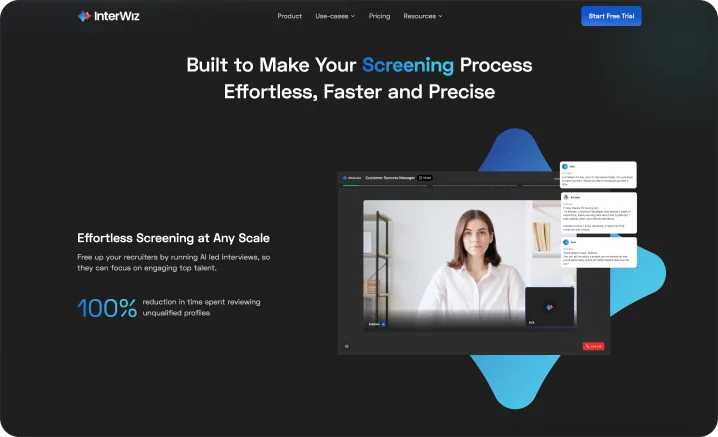
Best for teams seeking consistent, bias-aware interviews with deep skill insights. InterWiz specializes in structured AI-led interviews that measure both technical and soft skills. Weighted scoring is applied at the end of each interview, enabling faster and more evidence-based hiring decisions. Templates are fully customizable to align with specific job requirements, and standardized evaluation protocols help reduce bias.
Consider if: You want to standardize interviews across hiring teams, improve fairness, and capture detailed skill data at scale.
Unique strength: Ability to evaluate diverse skill sets, from coding to communication, in a single platform, without requiring multiple tools.
Limitation: No real-time scoring; results are available after interviews conclude.
HireVue – Enterprise-Scale Video Interviewing
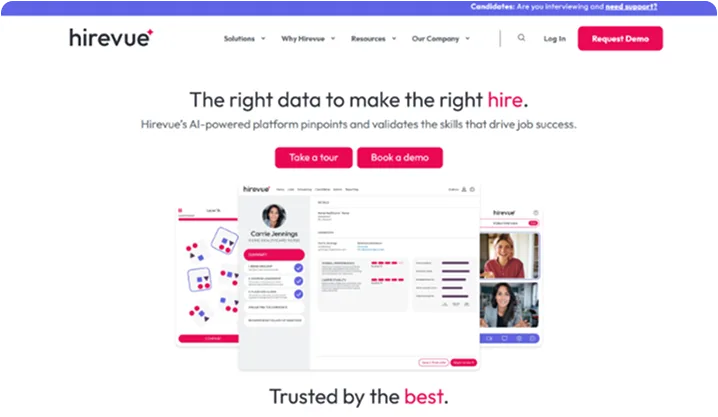
Following its 2023 acquisition of ModernHire, HireVue now combines high-volume video interviewing with ModernHire’s predictive analytics and Virtual Job Tryout assessments. This allows organizations to pair structured interviews with data-backed performance forecasting. HireVue also offers strong ATS integrations and support for multi-region, multi-language hiring.
Consider if: You manage large-scale, multi-role hiring and want advanced analytics to help forecast candidate success.
Unique strength: Combines interviewing, predictive scoring, and assessment in a single enterprise-ready platform.
Limitation: Higher cost and greater complexity; may require dedicated admin and recruiter training to maximize ROI.
Harver – Volume Hiring and Pre-Employment Testing
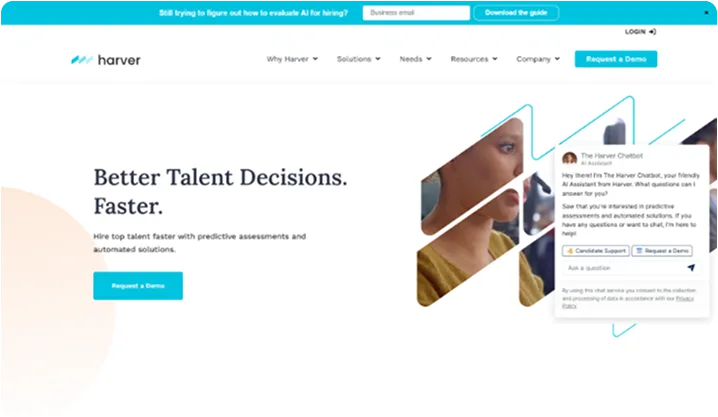
Harver is designed for organizations that need to screen and place candidates at scale. It offers behavioral, cognitive, and situational judgment tests, many with gamified elements to increase engagement. These assessments are particularly effective for frontline and entry-level positions.
Consider if: You prioritize speed, candidate engagement, and reducing time-to-fill in high-volume hiring environments.
Unique strength: Gamified assessments that improve candidate completion rates without compromising evaluation depth.
Limitation: Limited depth for advanced technical skills evaluation.
Eightfold AI – Talent Intelligence and Sourcing
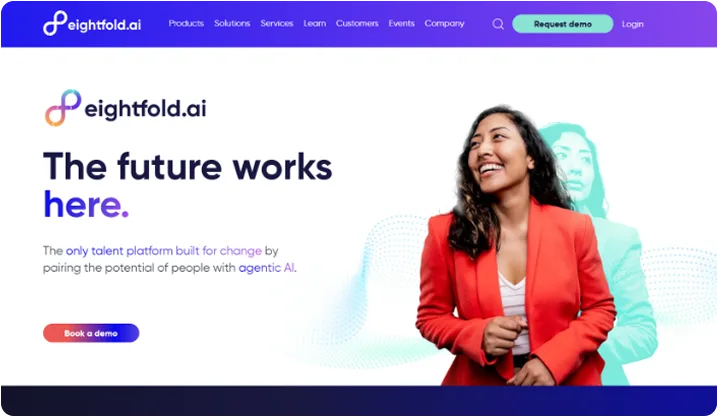
Eightfold AI focuses on sourcing, talent mapping, and matching, not interview automation. Its AI algorithms identify both active and passive candidates and can predict career paths based on skill and market data. Often used alongside other platforms for later hiring stages.
Consider if: You want to build long-term talent pipelines, engage passive candidates, and reduce reliance on job boards.
Unique strength: Predictive sourcing capabilities that surface candidates before they apply.
Limitation: Requires pairing with an interview and assessment platform for a complete hiring process.
XOR – Candidate Engagement and Chat-Based Recruiting
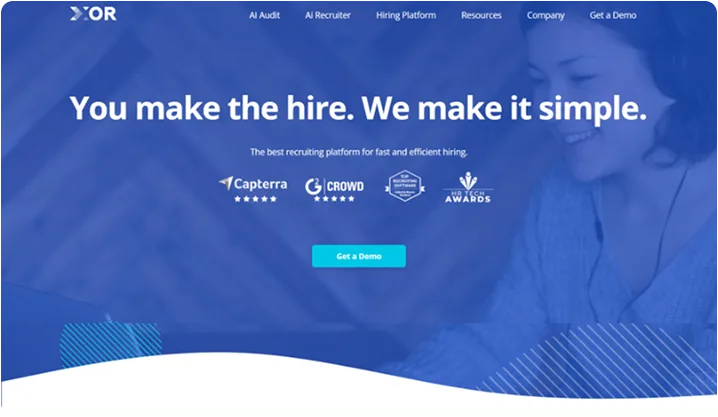
XOR automates candidate outreach, early screening, and interview scheduling through conversational AI. It’s designed to maintain engagement during the early stages of the funnel and reduce drop-offs caused by slow communication.
Consider if: You need to improve early-stage candidate response rates, particularly in competitive or high-volume markets.
Unique strength: Real-time, conversational engagement that shortens the time between sourcing and scheduling.
Limitation: Not suited for in-depth technical or soft skill evaluations.
Comparison table:
Tool | Best For | Key Strengths | Limitations |
InterWiz | Structured AI-led interviews and skills evaluation | Assesses both technical and soft skills; weighted scoring at interview end; customizable interview templates; bias reduction through consistent evaluation | No real-time scoring; best suited for organizations ready to adopt AI-led interviews |
HireVue | Enterprise-scale video interviewing | Advanced video analysis; large feature set; strong ATS integrations | Higher cost; may require extensive training to maximize features |
Harver | Volume hiring and pre-employment testing | Gamified and behavioral assessments; strong candidate matching algorithms | Limited depth in technical skills evaluation |
Eightfold AI | Talent intelligence and sourcing | Powerful candidate matching; passive candidate identification | Primarily focused on sourcing rather than interview automation |
XOR | Candidate engagement and chat-based recruiting | Conversational AI for outreach and scheduling | Less robust for technical or soft skill assessments |
Decision tip: Instead of aiming for a platform that does everything, shortlist tools that excel in your highest-impact areas, whether that’s faster screening, better interviews, deeper skill insights, or stronger candidate engagement. Integration with your current ATS or HR system should be a deciding factor, not an afterthought.
Also read: Artificial Intelligence in HR: How AI is Reshaping Human Resources
How to Choose the Right AI Recruitment Tool for Your Organization
Selecting the right AI recruitment tool comes down to matching its capabilities with your hiring needs, budget, and long-term talent acquisition strategy. The best choice is not always the most feature-packed platform, but the one that fits seamlessly into your recruiting process.
Key factors to consider:
Hiring volume and role types: High-volume hiring benefits from fast screening and automated interview scheduling, while specialized roles may require deeper skill assessments.
Integration with existing systems: Check whether the tool connects easily with your applicant tracking system (ATS) or other recruitment platforms to avoid workflow disruption.
Assessment capabilities: Look for tools that evaluate both technical and soft skills if your roles require well-rounded candidates.
Bias mitigation and compliance: Ensure the platform meets local and global regulations on data privacy and anti-discrimination.
Scalability and cost: Consider whether the platform can grow with your recruitment efforts without exceeding budget constraints.
Analytics and reporting: Choose a solution that offers actionable insights, not just data, to support better decision-making.
For example, organizations that value structured interviews and post-assessment scoring often find InterWiz aligns well with their needs. Its focus on bias-free evaluations and weighted scoring makes it a strong fit for teams hiring across multiple skill sets.
Common Challenges and Risks of AI Recruitment Tools
While AI recruitment tools can be a powerful asset, they also introduce challenges that organizations must address to ensure fair and effective hiring. Ignoring these risks can undermine both candidate trust and hiring outcomes.
Key challenges to watch for:
Algorithmic bias: If trained on biased historical data, AI models can unintentionally favor or disadvantage certain candidate groups, reinforcing inequalities.
Over-reliance on automation: Removing too much human judgment from the recruiting process can lead to overlooking strong candidates who may not match rigid AI patterns.
Data privacy concerns: Candidate information must be handled in compliance with regulations like GDPR and CCPA to prevent legal and reputational issues.
Candidate perception and trust: Some job seekers may feel uncomfortable with AI-led assessments if the process is not explained transparently.
Integration challenges: Poor integration with existing ATS or HR systems can cause delays and disrupt established workflows.
These risks can be mitigated through regular audits of AI systems, clear communication with candidates, and maintaining human oversight in all final hiring decisions. The most successful recruiting teams treat AI as an assistant to recruiters, not a replacement.
Future Trends in AI Recruitment
AI recruitment is evolving rapidly, driven by advances in technology, changing workforce dynamics, and tightening regulations. Over the next few years, decision-makers should anticipate:
Predictive hiring models: AI will increasingly use multi-source data, from past performance to cultural alignment indicators, to predict a candidate’s long-term success. This will be especially valuable for organizations that want to reduce turnover in high-cost roles.
Voice and sentiment analysis: Advanced interview platforms will analyze tone, pacing, and emotional cues in candidate responses to provide context beyond what’s said. For example, an engineering candidate’s ability to remain calm under pressure during a coding interview could be flagged as a positive performance indicator.
Hyper-personalized engagement: AI will create candidate experiences tailored to individual career interests, skill gaps, and preferred communication styles. A software developer might receive technical challenge invites, while a sales candidate could get scenario-based role-play prompts.
End-to-end integration: Recruitment tools will connect fully with ATS and HRIS systems, ensuring data moves seamlessly across sourcing, assessment, and onboarding stages. This reduces administrative burden and eliminates siloed workflows.
Regulatory compliance by design: Laws like NYC Local Law 144 and the EU AI Act are pushing vendors to build bias detection, transparency features, and candidate notification tools directly into their platforms. Compliance will no longer be an add-on; it will be a baseline requirement for adoption.
For staffing agencies, this means being able to market bias-aware, regulation-ready hiring processes as a competitive advantage. For tech companies, it means reducing interview load on engineers while staying compliant in global hiring. Platforms like InterWiz are already moving in this direction with structured, bias-aware assessments and scalable automation.
Bottom Line: Are AI Recruitment Tools Worth It?
AI recruitment tools deliver the most value when they are used to enhance, not replace, the recruiter’s role. By automating repetitive tasks such as screening, scheduling, and candidate ranking, they free hiring teams to focus on high-value activities like relationship building, strategic sourcing, and cultural fit assessment.
The return on investment depends on choosing a platform that aligns with your hiring goals, integrates smoothly with your systems, and includes safeguards against bias. For organizations seeking structured, multi-skill evaluations and bias-free scoring, solutions like InterWiz provide a strong balance of automation and human oversight.
Ultimately, the right AI recruitment tool can shorten time-to-hire, improve candidate quality, and create a more consistent and equitable hiring process, but only when paired with clear processes, ongoing monitoring, and a commitment to ethical hiring practices.
FAQs About AI Recruitment Tools
What’s the difference between an AI recruitment tool and an applicant tracking system (ATS)?
An ATS manages the hiring workflow and stores candidate data, while an AI recruitment tool uses artificial intelligence to enhance the process through automation, candidate matching, and advanced analytics. Many modern platforms integrate both.
Can AI recruitment tools find passive candidates?
Yes, some AI recruitment tools can search talent pools, job boards, and online profiles to identify passive candidates whose skills and experience align with open roles, then send automated outreach messages to engage them.
Do AI recruitment tools replace human recruiters?
No, AI recruitment tools are designed to support recruiters by removing repetitive tasks and providing data-driven insights. Human judgment is still essential for final hiring decisions, relationship building, and cultural fit assessment.
Are AI recruitment tools legal to use?
Yes, provided they comply with data privacy and anti-discrimination laws. Organizations should verify that their chosen platform meets relevant regulations such as GDPR, CCPA, and EEOC guidelines.
How do AI recruitment tools improve candidate experience?
By streamlining communication, reducing delays in interview scheduling, and ensuring consistent evaluation criteria, AI recruitment tools create a smoother, more transparent process for candidates.
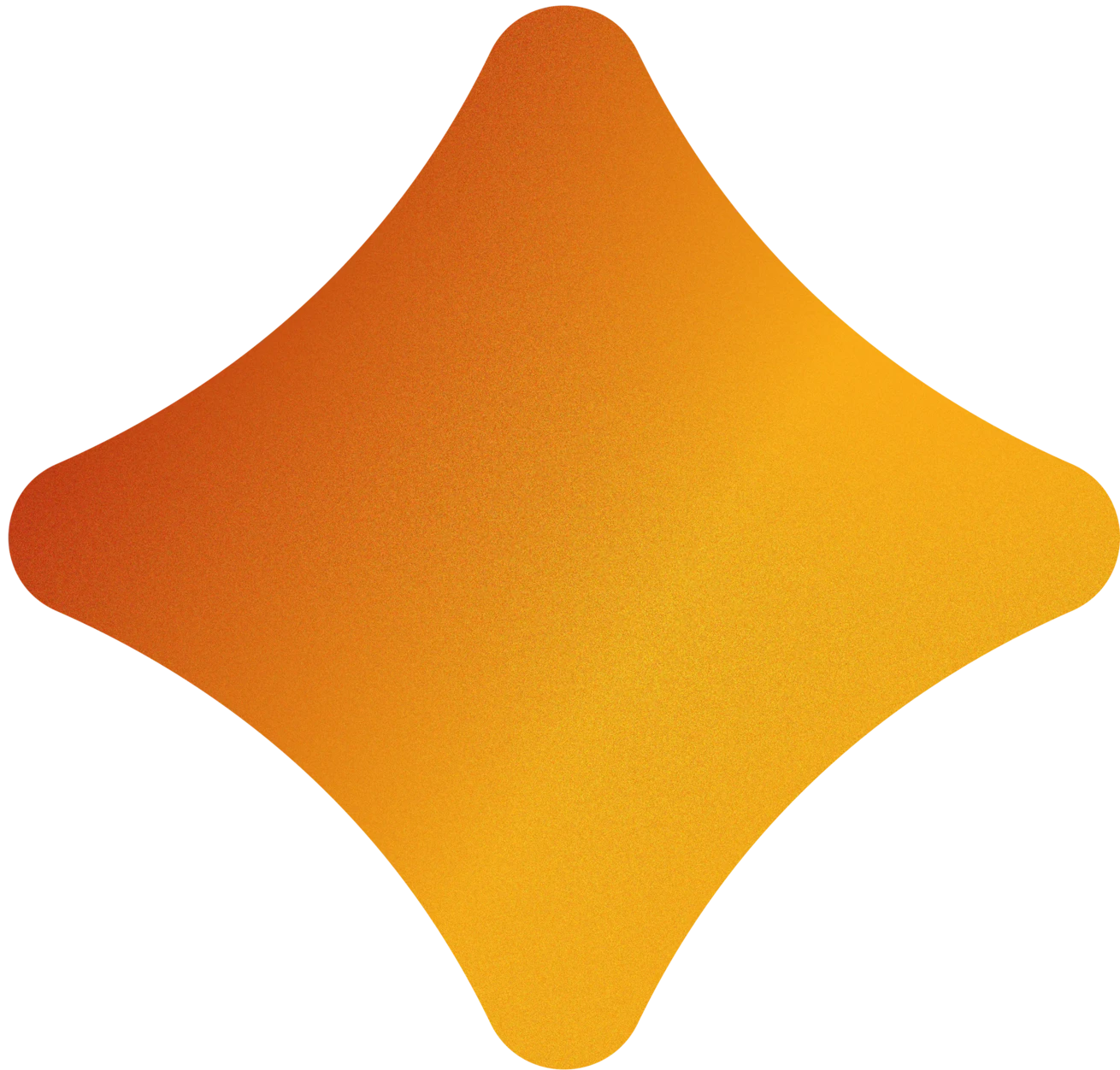
High Quality Screening with AI Interviews
Automated interviews built for speed, scale, and accuracy.
🔥 Full features, no credit card required.